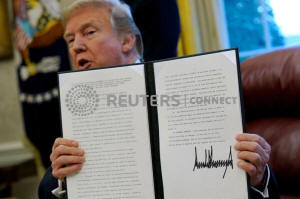|
A tax on a tax: U.S. customs demands
bigger bonds as trade tariffs rise
 Send a link to a friend
Send a link to a friend
 [March 29, 2019]
By Rajesh Kumar Singh [March 29, 2019]
By Rajesh Kumar Singh
CHICAGO (Reuters) - Stephen Wang is
counting the costs of President Donald Trump's trade war. He had to put
down 12 times more cash as a guarantee to U.S. customs that he would pay
the bill for tariffs on the Chinese-made pumps, valves and motors he
imports.
The cost of the guarantee - a U.S. customs bond - has shot up, an
additional hit to importers already facing steep customs bills adding up
to tens of billions of dollars for tariffs imposed by the Trump
administration on incoming Chinese goods, as well as steel and aluminum
imports.
Since coming into effect last year, the tariffs have pushed up
manufacturing costs, upended decades-old global supply chains and
inflated prices for consumers, resulting in lower sales and forcing
companies to defer investments. This, in turn, has dimmed global growth
outlook, roiling financial markets.
Other ripple effects are less obvious, among them the rising expense of
U.S. customs bonds. But for small companies that can ill afford the
added cost, the impact can be crippling.

Given the extra duties associated with Trump's tariffs, importers have
been forced to post bonds that are worth much more to guarantee they can
cover the added cost of bringing Chinese imports, and foreign steel and
aluminum, into the United States.
In some cases, customs bond requirements have increased 500-fold,
according to Reuters interviews with a dozen importers, underwriters and
customs brokers.
"Managing the cash flow has become tough," said Wang. If the tariff war
drags on, he warns, companies operating with thin profit margins and a
weak capital base could go bust.
Wang is the chief executive of Hengli America, which procures supplies
from China for customers such as CNH Industrial's construction and farm
equipment units.
After duties on its merchandise surged from zero to $6 million a year,
U.S. Customs required Hengli to post a $600,000 bond. Its previous bond
was $50,000.
Other importers reported similarly sharp increases.
Lisa Gelsomino, chief executive officer at underwriting firm Avalon Risk
Management, said one client recently had to replace a $50,000 bond with
one worth $26 million.
The rise in tariffs means that U.S. Customs and Border Protection (CBP)
has issued thousands of importers with notices that their bonds are
inadequate.
The CBP has issued about 3,500 insufficiency notices since January, it
said. That compares to an average of 2,070 notices a year for the period
between 2006 and 2017, according to data compiled by Roanoke Insurance
Group.
(Graphic on bond insufficiency notices https://tmsnrt.rs/2HwR2IM)
If importers fail to post a new bond within a month of receiving an
insufficiency notice, customs officials can hold the cargo and charge
additional fees. The CBP has around 224,000 active bonds on file.

No importer can ship goods into the country without posting a customs
bond. The bonds are set at 10 percent of the importer's total estimated
annual duties, fees and taxes.
The Trump administration's 25 percent import tariff on $50 billion of
Chinese imported goods, and another 10 percent on $200 billion of
imports, has added up. The annual tariff bill on Chinese goods alone
stands at $32.5 billion - requiring $3.25 billion in additional customs
bonds.
Separately, Washington has levied a 25 percent duty on imports of steel
and a 10 percent duty on those of aluminum.
"You are talking millions of dollars that is going out," said David
Meyer, head of customs brokerage and freight logistics company DJS
International Services Inc.
"But you don't have a million dollar tree that you are shaking in your
backyard to make sure that you have got that money...it has definitely
become a burden for importers."
More than half of Meyer's clients have seen at least a tenfold increase
in their bond amounts.
[to top of second column]
|

President Donald Trump speaks to reporters after signing directives
to impose tariffs on imported washing machines and solar panels
before signing it in the Oval Office at the White House in
Washington, U.S. January 23, 2018. REUTERS/Jonathan Ernst/File Photo

SURGING BOND REQUIREMENTS
What is proving painful for some importers has been a bonanza for
the firms that underwrite the bonds.
More costly bonds mean higher underwriting fees. They also mean
higher collateral requirements. Since underwriters are on the hook
if importers fail to pay duties, they want collateral that matches
the value of the bond; underwriters usually require 1-1.5 percent of
the bond amount to guarantee the bond.
At Roanoke Insurance Group, the workload has increased so much that
staff are working on weekends to handle it, said Colleen Clarke,
vice president at Roanoke.
In one example, she said, Roanoke required $9 million in collateral
from a steel importer that was asked to post a $9 million bond after
duties on its imports surged from zero to $90 million a year.
The steel importer also paid $90,000 in premium for the bond. The
end result: the importer needed to come up with just over $99
million a year to continue to import $360 million of steel.
That is complicating finances for importers. The trade war has also
driven up some raw material, freight and warehousing costs, raising
the risks that some importers might default on payment obligations.
"Most of the importers are not used to paying these duties," said
Roanoke's Clarke. "The risk is – do they have cash infusion from
somewhere else to pay these duties?"
Amy Magnus, who heads the National Customs Brokers & Forwarders
Association of America, whose members work with over 250,000
importers and exporters, said a client who used to import Canadian
steel went bankrupt after his shipments were subjected to a 25
percent tariff. She declined to share more details.

EXPENSIVE LOANS, DELAYED PAYMENTS
Four customs brokers told Reuters that some of their small-size
clients had stopped importing goods altogether.
Hengli's Wang says his cash flow needs have risen fourfold since
July, forcing him to delay payments to his Chinese suppliers. In
addition to higher costs, he is losing customers - some have
switched to cheaper non-Chinese goods suppliers.
Precision Components, whose customers include Fortune 500 companies,
imports bearings from China. Since July 6, when U.S. tariffs on
bearings imports rose 25 percent, the cost of each container it
receives from China has risen by $15,000, said Dave Hull, the firm's
president. The company imports around 40 containers a year.
It has been borrowing on average $200,000 a month since last July to
meet its working capital requirements, Hull said, up from around
$50,000 prior to that.
What's more, custom brokers, who sometimes pay duties on behalf of
their clients, are demanding quicker repayment, said Jane Sorensen,
president of the Chicago Customs Brokers & Forwarders Association.
They are asking importers to repay in 7-10 days, she said, compared
with the more typical 30-day time frame.
Bill Sharpe, a customs broker in Chicago, says he has halved his
collection time to 15 days. Even so, he worries about the risks of
clients defaulting.
"We are having to keep a close eye on all our clients to make sure
they don't turn into a credit risk," Sharpe said.
(Reporting by Rajesh Kumar Singh; Editing by Simon Webb and Paul
Thomasch)
[© 2019 Thomson Reuters. All rights
reserved.]
Copyright 2019 Reuters. All rights reserved. This material may not be published,
broadcast, rewritten or redistributed.
Thompson Reuters is solely responsible for this content.
 |